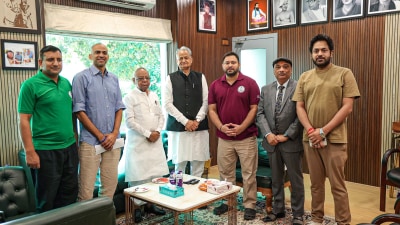It’s not just about football
As Germany throws open its doors for the World Cup, the organizers have given Germans a simple set of marching orders: make friends.

As Germany throws open its doors for the World Cup, the organizers have given Germans a simple set of marching orders: make friends. Even that rather bland sentiment could carry an edge in a land that once struggled with this concept.
But the remarkable thing about this World Cup is how untroubled Germans are about their image, or their place in the world. The only pressure, perhaps, is whether the Germans know how to put on a good party.
“Germans are not in the mood to prove anything,” said Gunter Gebauer, a philosopher and expert on sports at the Free University of Berlin. “They really just want to have a good time.”
The relaxed mood comes despite jitters about violence by soccer hooligans, particularly from England or Poland, or terrorist attacks, which the German authorities are guarding against with 280,000 police officers and NATO surveillance planes. German authorities have also been rattled by the prospect that Iran’s president, Mahmoud Ahmadinejad, may come to watch his country’s team play in a later round if it defies predictions and advances.
On the field, Brazil is expected to dominate, and Germans have largely dismissed their team’s chances despite its significant home-field advantage. A German victory – so treasured in 1954, when it helped lift the country out of the ashes of war; in 1974, when it capped a trouble-free tournament in West Germany; and in 1990, when it symbolized the hope of Germany’s reunification – now seems less vital to the country’s self-image.
Germany is keeping score in other ways, with an economy that has begun to grow again after five years of stagnation, and with a “grand coalition” government, led by Chancellor Angela Merkel, that has enjoyed an unusually long honeymoon after a year of political paralysis.
–Mark Landler & Jere Longman






- 01
- 02
- 03
- 04
- 05

























